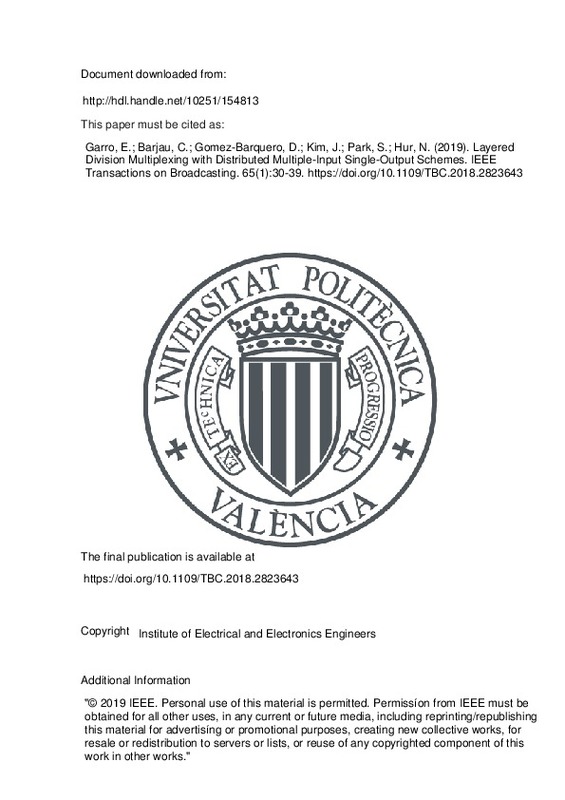JavaScript is disabled for your browser. Some features of this site may not work without it.
Buscar en RiuNet
Listar
Mi cuenta
Estadísticas
Ayuda RiuNet
Admin. UPV
Layered Division Multiplexing with Distributed Multiple-Input Single-Output Schemes
Mostrar el registro sencillo del ítem
Ficheros en el ítem
| dc.contributor.author | Garro, Eduardo
|
es_ES |
| dc.contributor.author | Barjau, Carlos
|
es_ES |
| dc.contributor.author | Gomez-Barquero, David
|
es_ES |
| dc.contributor.author | Kim, Jeongchang
|
es_ES |
| dc.contributor.author | Park, Sung-Ik
|
es_ES |
| dc.contributor.author | Hur, Namho
|
es_ES |
| dc.date.accessioned | 2020-11-11T04:32:41Z | |
| dc.date.available | 2020-11-11T04:32:41Z | |
| dc.date.issued | 2019-03 | es_ES |
| dc.identifier.issn | 0018-9316 | es_ES |
| dc.identifier.uri | http://hdl.handle.net/10251/154813 | |
| dc.description | "© 2019 IEEE. Personal use of this material is permitted. Permissíon from IEEE must be obtained for all other uses, in any current or future media, including reprinting/republishing this material for advertisíng or promotional purposes, creating new collective works, for resale or redistribution to servers or lists, or reuse of any copyrighted component of this work in other works." | es_ES |
| dc.description.abstract | [EN] Single frequency networks (SFNs) provides an increased spectral efficiency compared to the traditional multiple frequency networks. However, some coverage areas in SFN can be affected by destructive interferences. In order to reduce these situations, distributed multiple-input single-output (MISO) schemes have been adopted in the new digital terrestrial television standards, Alamouti in DVB-T2 and transmit diversity code filter sets in ATSC 3.0. On the other hand, layered division multiplexing (LDM), a non-orthogonal multiple access technology, has been adopted in ATSC 3.0 due to its spectral efficiency increase compared to time or frequency division multiplexing. The LDM signal is formed by a power superposition of two independent signals, which are designed for different reception conditions (mobile and fixed-rooftop). The combination of distributed MISO and LDM techniques has not been evaluated yet. In this paper, the joint transmission of LDM with distributed MISO is analyzed in terms of complexity and the joint performance is evaluated by means of physical layer simulations. | es_ES |
| dc.description.sponsorship | This work was supported in part by the ICT Research and Development Program of MSIP/IITP (Development of Transmission Technology for Ultra High Quality UHD) under Grant 2017-0-00081, and in part by the Ministerio de Educacion y Ciencia, Spain, through European FEDER funds under Grant TEC2014-56483-R. | es_ES |
| dc.language | Inglés | es_ES |
| dc.publisher | Institute of Electrical and Electronics Engineers | es_ES |
| dc.relation.ispartof | IEEE Transactions on Broadcasting | es_ES |
| dc.rights | Reserva de todos los derechos | es_ES |
| dc.subject | Layered Division Multiplexing (LDM) | es_ES |
| dc.subject | Single Frequency Network (SFN) | es_ES |
| dc.subject | Multiple-Input Single-Output (MISO) | es_ES |
| dc.subject | Alamouti | es_ES |
| dc.subject | Transmit Diversity Code Filter Sets (TDCFS) | es_ES |
| dc.subject | ATSC 3.0 | es_ES |
| dc.subject | Terrestrial broadcasting | es_ES |
| dc.subject.classification | TEORIA DE LA SEÑAL Y COMUNICACIONES | es_ES |
| dc.title | Layered Division Multiplexing with Distributed Multiple-Input Single-Output Schemes | es_ES |
| dc.type | Artículo | es_ES |
| dc.identifier.doi | 10.1109/TBC.2018.2823643 | es_ES |
| dc.relation.projectID | info:eu-repo/grantAgreement/MINECO//TEC2014-56483-R/ES/TECNOLOGIAS DE RADIODIFUSION DIGITAL EXTRA-TERRESTRES/ | es_ES |
| dc.relation.projectID | info:eu-repo/grantAgreement/MSIP//IITP-2017-0-00081/ | es_ES |
| dc.rights.accessRights | Abierto | es_ES |
| dc.contributor.affiliation | Universitat Politècnica de València. Departamento de Comunicaciones - Departament de Comunicacions | es_ES |
| dc.contributor.affiliation | Universitat Politècnica de València. Instituto Universitario de Telecomunicación y Aplicaciones Multimedia - Institut Universitari de Telecomunicacions i Aplicacions Multimèdia | es_ES |
| dc.description.bibliographicCitation | Garro, E.; Barjau, C.; Gomez-Barquero, D.; Kim, J.; Park, S.; Hur, N. (2019). Layered Division Multiplexing with Distributed Multiple-Input Single-Output Schemes. IEEE Transactions on Broadcasting. 65(1):30-39. https://doi.org/10.1109/TBC.2018.2823643 | es_ES |
| dc.description.accrualMethod | S | es_ES |
| dc.relation.publisherversion | https://doi.org/10.1109/TBC.2018.2823643 | es_ES |
| dc.description.upvformatpinicio | 30 | es_ES |
| dc.description.upvformatpfin | 39 | es_ES |
| dc.type.version | info:eu-repo/semantics/publishedVersion | es_ES |
| dc.description.volume | 65 | es_ES |
| dc.description.issue | 1 | es_ES |
| dc.relation.pasarela | S\354730 | es_ES |
| dc.contributor.funder | European Regional Development Fund | es_ES |
| dc.contributor.funder | Electronics and Telecommunications Research Institute, Corea | es_ES |
| dc.contributor.funder | Ministry of Science, ICT and Future Planning, Corea del Sur | es_ES |
| dc.contributor.funder | Ministerio de Economía y Competitividad | es_ES |







![[Cerrado]](/themes/UPV/images/candado.png)

